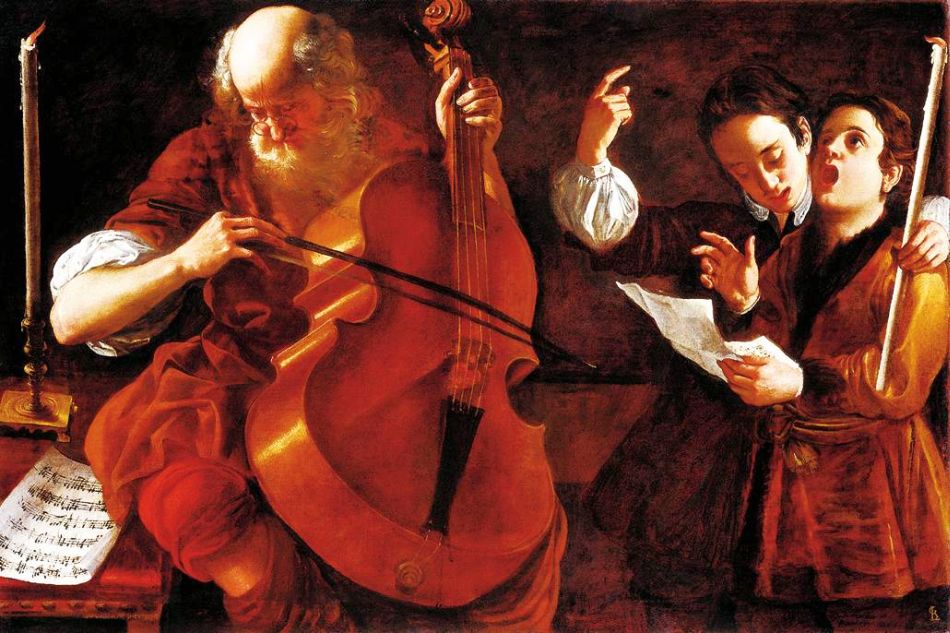DAWN
Daily Arts Web Nucleus
Discover the Arts! Each day a different image from the Literary, Performing, or Visual Arts representing a portion of Scripture plus an explanation with links 2015 January 25
Concert with Two Singers (first half of 18th century)
Giovanni Domenico Lombardi (1682-1751)
Baroque Style
Private Collection
Image Source: Web Gallery of Art
Explanation: In Job 35 Elihu continued to chide Job. In verse 10 he said that men (like Job) ignore God even though God is the one who "gives songs in the night." The painting above depicts this aspect of the chapter.
[ THEMATICALLY AND CHRONOLOGICALLY RELATED SCRIPTURES: Job 32. Job 33. Job 34. Job 36. Job 37. ]
[ CHRONOLOGY: General. Patriarchs (Traditional). Judges # 1. Judges # 2. Kings # 1. Kings # 2. Prophets # 1. Prophets # 2. NT # 1. NT # 2. NT # 3. ]
[ MAPS: Maps # 1. Maps # 2. Maps # 3. Maps # 4. Maps # 5. ]
Elihu continued his criticism of Job for making accusations against God. Elihu accused Job of saying that his righteousness was more than God's and of saying that it was of no profit to be cleansed from his sin. (1-3). To counter such a notion, Elihu said that Job's sin did not hurt God; nor did his righteousness profit God. These things may hurt or profit men, but not God (4-8). Expanding on these ideas, Elihu describes how oppressors and the oppressed interact with each other. The oppressed cry out, but they do not turn to God their maker who gives songs in the night because they are too proud. Therefore they do not turn to him even though he could give them wisdom which surpasses that which they might find from nature -- wisdom such as beasts or birds possess (9-12). Moreover, God does not hear Job because Job speaks vain things; and God does not hear vanity (verses 13 & 16). Also, Job complained that he could not see God; but judgment precedes God (like a herald) and reveals him -- the implication being that Job could see and understand God if he acquiesced to God's judgment instead of despising it (14). Moreover, as an additional incentive to acquiesce to God's judgment, Elihu pointed out that when God judges in anger it is less than men deserve (15). These are the reasons that Job's accusations against God were empty and without knowledge.
Job 35
1 Elihu spake moreover, and said,
2 Thinkest thou this to be right, that thou saidst, My righteousness is more than God's?
3 For thou saidst, What advantage will it be unto thee? and, What profit shall I have, if I be cleansed from my sin?
4 I will answer thee, and thy companions with thee.
5 Look unto the heavens, and see; and behold the clouds which are higher than thou.
6 If thou sinnest, what doest thou against him? or if thy transgressions be multiplied, what doest thou unto him?
7 If thou be righteous, what givest thou him? or what receiveth he of thine hand?
8 Thy wickedness may hurt a man as thou art; and thy righteousness may profit the son of man.
9 By reason of the multitude of oppressions they make the oppressed to cry: they cry out by reason of the arm of the mighty.
10 But none saith, Where is God my maker, who giveth songs in the night;
11 Who teacheth us more than the beasts of the earth, and maketh us wiser than the fowls of heaven?
12 There they cry, but none giveth answer, because of the pride of evil men.
13 Surely God will not hear vanity, neither will the Almighty regard it.
14 Although thou sayest thou shalt not see him, yet judgment is before him; therefore trust thou in him.
15 But now, because it is not so, he hath visited in his anger; yet he knoweth it not in great extremity:
16 Therefore doth Job open his mouth in vain; he multiplieth words without knowledge.
ADDITIONAL AD LIB MATERIAL: Prose, Poetry, Writers, Visual Artists, Music, DAWN, and ILLUMINATION. ILLUMINATION features a compact, Illuminated Bible. DAWN, the page you are presently visiting, features a new image and explanation daily.
Please Email Comments and Questions To
AD LIB ARTS EMAIL
copyright 2014, Scott Souza
|
